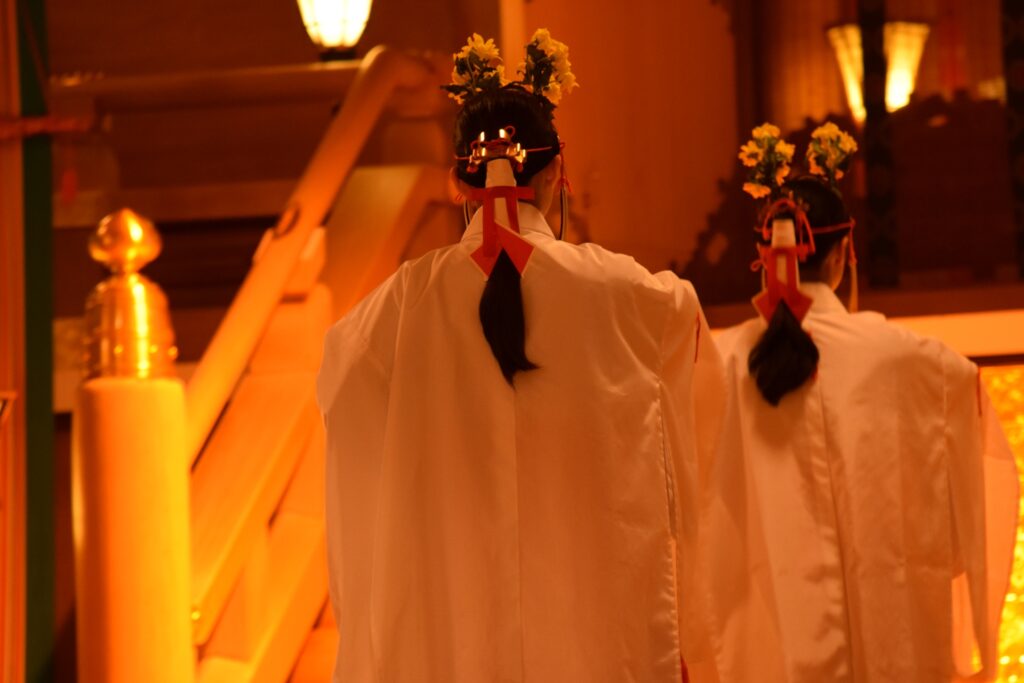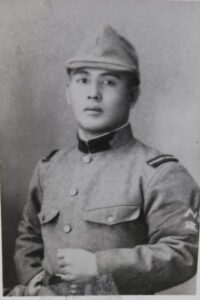How an 8th-century exchange of poems bridged status, culture, and hearts
In the year 731, on a cold winter’s day in ancient Japan, a high-ranking official named Ōtomo no Tabito paused his departure from the distant province of Tsukushi.
Before him stood Kojima, a young traveling dancer.
They were not lovers, nor even close acquaintances.
Yet in that fleeting moment, they exchanged poems—four short verses that crossed the boundaries of rank, distance, and circumstance.
In their words, we can still hear the heartbeat of Japan’s ancient culture: a tradition where resonance between souls mattered more than titles or positions.

Two shrine maidens (miko) dressed in traditional white garments and floral headpieces perform a sacred kagura dance inside a warmly lit Shinto shrine.
1. A Winter Farewell at the Water Fortress
It was January 731 (the twelfth month of Tenpyō 2).
Ōtomo no Tabito, governor of the Dazaifu in Kyushu, had just been promoted to the prestigious court rank of Dainagon.
He was returning to the imperial capital, Kyoto, to receive his appointment.
His procession halted at Mizuki—the “Water Fortress,” a massive earthen rampart built after Japan’s defeat at the Battle of Baekgang to guard against a possible Tang invasion.
Looking back at the Dazaifu from atop the rampart, Tabito noticed the people who had come to see him off.
Among them was a young woman named Kojima, a yugyō no amame—a traveling female performer who danced and sang for sacred rituals.
On the spot, Kojima composed and presented two waka poems to Tabito:
If I were an ordinary woman,
I would wave my sleeves until they ached,
Though it be presumptuous—
Yet here I stand, restraining myself.
Though the road to Yamato
disappears into clouds,
please do not think it rude
that I wave my sleeves to you.
2. A Reply That Stopped the Procession
Protocol did not require a governor to respond to a common woman’s poem—especially while leading an official procession to the capital.
But Tabito halted his entourage, took up his brush, and composed two waka in reply:
When I pass through Kojima
in the land of Kibi,
I will remember you, Kojima of Tsukushi.
who trembled at our parting.
I have always thought
myself a man of fortitude,
yet here I stand on the Water Fortress,
brush in hand,
unable to keep my tears from falling.
3. More Than Sentiment—A Cultural System
What makes this exchange extraordinary is not romance—it is what it reveals about ancient Japan.
First, yugyō no amame were not “courtesans” in the later sense of the word.
They were ritual artists whose origins trace back to the mythic Ame-no-Uzume, the Shinto goddess who danced to draw the sun from hiding.
Their performances were spiritual acts, and their cultural lineage would evolve into sarugaku, Noh, and eventually kabuki.
Second, this episode shows the high level of female literacy in 8th-century Japan.
Even a traveling performer could compose elegant waka in Chinese characters and exchange them with a senior government official.
In much of the contemporary world, female literacy was negligible—even in Europe’s great cities of the 18th century, literacy rates for women rarely exceeded 10%.
By contrast, here was a young Japanese woman composing refined verse that would be preserved in the Man’yōshū.
Third, and perhaps most remarkable: poetry functioned as a direct channel between commoners and the elite.
A person of no official status could address a high-ranking official through verse—and receive a sincere reply.
In modern terms, it was as if an ordinary citizen could email the head of state and receive a personal, heartfelt response.
4. Misinterpretations and the Reality
Some modern commentators—sometimes even respected scholars—have looked at this exchange and hastily imagined a romantic or physical relationship between Ōtomo no Tabito and Kojima.
One interpretation claims that, because Tabito had recently lost his wife, he “took” the young performer for himself.
Such readings ignore the realities of the time.
This farewell took place on the day Tabito began his official journey to the capital, leading a long procession of subordinates, including the sakimori—frontier guards known for their rough discipline and martial pride.
If the provincial commander had openly engaged in such conduct, it would have undermined morale and eroded the respect of his men.
In a military culture where leadership depended on honor and example, such a lapse could end a career; it certainly would not be recorded proudly in the Man’yōshū.
The culture of waka was, above all, a culture of refinement and implication.
Poems could hold layered meanings, but the point was to elevate thought and feeling, not to broadcast scandal.
To reduce this dignified exchange to a crude episode is to miss the very essence of the tradition—and to underestimate the moral expectations placed upon those in high office.
5. The Spirit of Resonance (Kyōmei) and Shared Tremor (Kyōshin)
Seen in its true light, this was not a casual politeness, nor a hidden liaison.
It was an act of resonance—kyōmei—in which two people, separated by rank and life path, recognized and honored each other’s humanity.
It recalls scenes from much later in Japanese history, such as the wartime folk song Zundoko-bushi:
Not the one who shook my hand at the train window,
but the girl crying in the shadows of the platform—
I can never forget her.
Such moments are not always about love.
They are about shared feeling, the shared tremor—kyōshin—that arises when two hearts meet in sincerity, however briefly.
Whether on a train platform in the 20th century or atop the Water Fortress in the 8th, these are the encounters that lodge deepest in memory.
6. Why It Still Matters
Ōtomo no Tabito’s gesture was more than gallantry.
It embodied the ideal of Japan as a shirasu kuni—a realm “ruled” not by domination, but by the sovereign’s care for each subject as an ōmitakara, a treasured person.
In this worldview, rank exists to protect and honor the people, not to elevate the few above the many.
That winter day, the highest official in Kyushu halted his formal procession to respond to the heartfelt verse of a young traveling performer.
In doing so, he left us more than two poems: he left a testament to a society in which human connection could transcend status, and where a leader’s dignity was measured as much by empathy as by authority.
Across twelve centuries, the voices of Tabito and Kojima still resonate.
In them, we can hear the quiet heartbeat of a culture that knew compassion as a form of strength—and understood that even a brief moment of shared feeling can echo across the ages.


